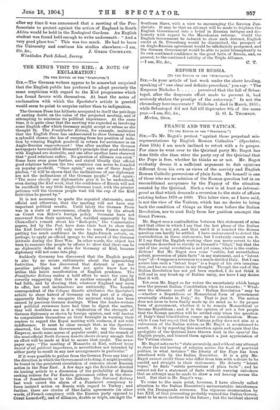pro VTR EDITOR OF THE "SPECTA.TOIL"3 SIR,--The German writers appear
to be somewhat surprised that the English public has preferred to adopt precisely the same scepticism with regard to the Kiel programme which has found favour with themselves. At least the notes of exclamation with which the Spectator's article is greeted would seem to point to surprise rather than to indignation.
The German Press has hitherto arrogated to itself the privilege of casting doubt on the value of the projected meeting, and of attempting to minimise its political importance. At the same time, it is quite clear that the meeting was regarded as involving some English offer which Germany might accept or refuse as she thought fit. The Frankfurter Zeitung, for example, maintains that the English Press has endeavoured to show Germany what a splendid chance she has of escaping from her position of isola- tion by winning English goodwill in return for assistance in an Anglo-Russian rapprochement ! One after another the German newspapers have recalled Bismarck's principle that good relations with England are desirable, and one after another have observed that "good relations suffice. No question of alliance can exist." Some have even gone further, and stated bluntly that official good relations between the two countries can never be founded on popular goodwill. "Once again," says one of these Anglo- phobes, " it will be shown that the inclinations of our diplomacy are not the inclinations of the German people." And again : "The more clearly our diplomatists give it to be understood, even during the Kiel week, that the confidence of Russia will not be sacrificed to any little Anglo-German toast, with the greater patience- will the German people wait till the cup of the Kiel festivities be passed by."
It is not necessary to quote the repeated statements, semi- official and otherwise, that the meeting will not have any important political results. Until lately the German Press was in a state of nervousness, clearly shown by the attack on Count von Billow's foreign policy. Germans have not recovered from their mistrust, but, terrified apparently by the Chancellor's remark about his "flesh-pots," the Conservative papers, led by the Post, have done their best to show that the Kiel festivities will only serve to warn France against putting too much confidence in the Anglo-French entente, or, perhaps, to apply an official sponge to the record of the German attitude during the Boer War. bIn other words, the object has been to reassure the people by efforts to show that there can be no diplomatic defeat in store for Germany at Kiel, because diplomacy will not come into play.
Suddenly Germany has discovered that the English people is also by no means enthusiastic about the approaching festivities. She has discovered that distrust is not her peculiar privilege, and she does not quite know how to utilise this latest manifestation of English prudence. The Frankfurter Zeitung makes a bold effort to meet the case by covertly suggesting that this is another example of English bad faith, and by showing that, whatever England may seem to offer, her real inclinations are unfriendly. The London correspondent of the Cologne Gazette attributes the Spectator's article to sheer hatred of Germany on the part of a clique, apparently failing to recognise the mistrust which has been caused by previous German dealings. When the leader-writers and political reviewers have had time to digest the matter, they will doubtless see in it a vindication of the strength of German diplomacy as shown by foreign opinion, and will hasten to congratulate themselves on their foresight in warning their readers to regard the Royal meeting with coolness, if not with indifference. It must be clear enough that, as the Spectator observed, the German Government, not to say the German Emperor, needs some access of popular credit; and the remark of the semi-official North German Gazette shows clearly enough that an effort will be made at Kiel to secure that credit. The news- paper says : "The meeting of Monarchs at Kiel, without being devoid of all political importance, is nevertheless not intended by either party to result in any new arrangements in particular."
If it were possible to gather from the German Press any hint of the direction in which the Government is looking, it might possibly be found in the persistent circulation of rumours about Russian
action in the Near East. A few days ago the Ileichsbote devoted its leading article to a discussion of the probability, of Russia
seeking redress for Far Eastern grievances either in the direc-
tion of Scandinavia or in the Balkans. The National Zeitung last week raised the alarm of a Panslavist conspiracy to force isolated action on Russia with regard to Turkey ; and further, there are stories of Slav-Latin agreements (in other words, of French conspiracy with the Russian party opposed to Count Lamsdorff), and of alliance; double or triple, amongst the Southern Slays, with a view to encouraging the Russian Fan- slavists. It may be that an attempt will be made to frighten the English Government into a belief in Russian intrigue and dis- honesty with regard to the Macedonian reforms. Could the English Government be induced to show such distrust, English credit at St. Petersburg would be diminished, the prospect of an Anglo-Russian agreement would be intlefinitely postponed, and the German Government would be able to point triumphantly to its own continued confidence in the good faith of Russia, and, en passant, to the continued validity of the Triple Alliance.
—I am, Sir, &c., 0. T.
REFORM IN RUSSIA.






































 Previous page
Previous page